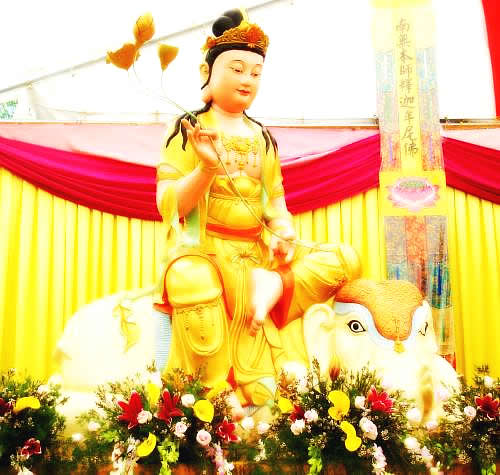 |
|
Dharma Joy
A talk given by Brooks Hansard on August 20, 2012
Good evening all good and wise advisors. Amitofo! This evening I would like to talk about a wholesome quality of mind that I think is an important aspect of the Path—Dharma joy. A few weeks ago I learned an interesting fact when talking to a Bhikshu here at CTTB. I learned that in the Southern Buddhist tradition there are some who believe that a Buddhist practitioner will not create merit when practicing a Dharma-door unless he or she also gives rise to joy in response to that practice. I found that to be very interesting, because I know for myself that there are times when I do Dharma practices without giving rise to joy in my mind, which from that perspective would mean I am not creating any merit during those occasions. Of course, our tradition would disagree with that view, and would see any cultivation of a Dharma-door as being meritorious, regardless of whether it elicits joy or not. However, what I found interesting about that view, is the great importance that it places on Dharma joy. In that sense, I can certainly agree with such a standpoint. I think a mind that produces joy while cultivating a Buddhist practice gives rise to much more merit and virtue than a mind that is merely “going through the motions” in a state of indifference to the practice.
There are several benefits that I see that derive from establishing Dharma joy in one's mind due to one's own practice or due to rejoicing in others' merit and virtue. First of all, Dharma joy can cool and moisten our minds during intense practice. When we cultivate, we are working at burning up the afflictions and outflows within our minds.
Therefore, our Dharma practice can be compared to the hot sun, as it burns up the afflictions in our minds. However, just like something that's been exposed for too long out in the sun, our minds can become dry and parched from the fiery effect of our practice…
However, if our minds give rise to Dharma joy in response to our practice, then that Dharma joy can act as cool, sweet dew that can nourish our minds by making them soft, moist, flexible, and pliant, full of youthful energy and vivacity.
Moreover, I believe Dharma joy is a necessary requirement for those who want to stay vigorous on the Path for many years. Perhaps a person can stay vigorous on the Path for two or three years relying on sheer will-power and strong resolve alone. However, I feel like such vigorous practice cannot be maintained over the long run if the practitioner isn't also relying on the beneficial effects of Dharma joy. Dharma joy keeps us inspired and motivated, as we look forward to our next opportunity to cultivate. To use the metaphor of the Great Vehicle: sympathetic joy is like the oil that keeps the parts of the Great Vehicle well-lubricated and in good condition, so that the vehicle can travel a far distance on its journey, without breaking down.
Rejoicing in others' merit and virtue is also very beneficial. For one, it helps to stop jealousy from arising in the mind. When we are living and cultivating amongst many sincere practitioners, we encounter lots of people finding success in their practice. Rather than getting jealous at their accomplishments, we can instead cultivate wholesome dharmas by rejoicing in their achievements and aspiring to someday emulate them ourselves.
There is no doubt that rejoicing in others' merit is a valuable practice, because Universal Worthy Bodhisattva teaches the importance of sympathetic joy by including it as the fifth vow of his 10 Great Vows.
Universal Worthy teaches how he completely follows along with and rejoices in all the merit and virtue of all the Buddhas, Bodhisattvas, Sound Hearers, Pratyeka-Buddhas, Learners, Those Beyond Study and all the other myriad sentient beings, even if their merit and virtue is as small as a mote of dust. Constantly throughout the Avatamsaka Sutra, Universal Worthy's conduct and vows are praised, and since rejoicing in others' merit and virtue is one of the 10 Great Vows of Universal Worthy, we know that it is a very important practice.
I'd like to share with you a first-hand experience I had with this a few weeks ago. During Morning Ceremony I started contemplating our Way Place here at CTTB. I contemplated how in today's age it's very difficult to encounter a Sangha that places high importance on the Pratimoksha and the precepts, and how difficult it is to encounter a lineage of an enlightened master who places great importance on virtue. I contemplated how I have been very blessed to encounter such a Sangha and to live amongst such good and wholesome friends who can inspire me on the Path. I then contemplated the pure lifestyle of the Dharma Masters here and while contemplating that purity, great joy arose in my mind, as I thought, “Wow, this is wonderful! How rare!” For the rest of the Morning Ceremony my mind single-pointedly contemplated that thought, and the joy never ceased. I then returned to my room and meditated for one hour. During the walk back to my room and during that one hour sit, I continued to rejoice in the merit and virtue of the pure lifestyle of the Dharma Masters here. During that meditation my mind became the most pacified and free of afflictions that it has ever been. After I got up from the sit, I contemplated how Universal Worthy gives great importance to rejoicing in others' merit and virtue and I realized that I had just seen first-hand why that is considered to be such a powerful practice.
Another way in which rejoicing in others' merit can benefit us on the Path is through applying it in a very expedient way, which I learned from reading the teachings of Nagarjuna Bodhisattva. In the Mahaprajnaparamita Shastra, Nagarjuna explains how, if a Bodhisattva expediently combines the practice of sympathetic joy with the practices of transference of merit and prajna paramita, his or her merit will surpass even the merit of the person whose action the Bodhisattva is rejoicing in.
I will first give his definition of sympathetic joy, or as we call it here at CTTB, rejoicing in others' merit and virtue. He says: Here is an example of sympathetic joy. Someone is practicing the qualities of enlightenment, such as generosity, morality, dhyana, etc.; a spectator rejoices in it and congratulates him, saying: “That is good; in this impermanent world enveloped in the shadows of ignorance, you are strengthening the great mind of bodhi and you are planting this merit.” Nagarjuna goes on to say: Imagine there is a seller and a purchaser of all sorts of wonderful perfumes; a third person comes near and stands to one side. He also breathes the perfumed air; the perfume, nevertheless, does not diminish at all and the two people doing business lose nothing. Imagine also a donor and a recipient of the donation; a third person, standing beside them, is joyful in the good action. He rejoices with them, but the other two lose nothing. Such is the characteristic of sympathetic joy.
Nagarjuna then explains how a Bodhisattva can use sympathetic joy to surpass a Sravaka's or Pratyekabuddha's qualities of enlightenment if he or she also practices the perfection of wisdom. He says: The bodhisattva-mahāsattva who, by a thought of sympathetic joy, wishes to surpass the generosity of all the śrāvakas and pratyekabuddhas, must practice the perfection of wisdom. The bodhisattva-mahāsattva who, by a thought of sympathetic joy, wishes to surpass the morality of the śrāvakas and pratyekabuddhas must practice the perfection of wisdom.
He also explains how a Bodhisattva can combine sympathetic joy with the transference of merit to become a great disciple of the Buddha. He says: By means of a simple mind of sympathetic joy in regard to the virtuous qualities of another, the bodhisattva gains merit infinitely superior to the merit of all other beings, for he transfers this merit to anuttarasamyaksambodhi. Taking delight in the virtuous qualities of another and transferring the merit to anuttarāsamyaksaṃbodhi places the bodhisattva in the first rank of the Buddha’s disciples.
He then goes on to state a potential question that someone could ask, which is: How can the bodhisattva, by means of a mind of sympathetic joy, surpass the śrāvakas and pratyekabuddhas who, themselves, are the ones involved in giving? Here is Nagarjuna's answer: While the śrāvakas and pratyekabuddhas are making such gifts, the bodhisattva who is standing by, notices them. He thinks about it carefully, is pleased thereby and congratulates the authors of those actions. Taking the merit resulting from this sympathetic joy, he then transfers it to anuttarasamyaksaṃbodhi. Thus he gains immense Buddha attributes. By means of the twofold merit of sympathetic joy and the transference of merit, he surpasses the generosity carried out by the śrāvakas and pratyekabuddhas. Furthermore, by means of his knowledge of the emptiness of dharmas and his sympathetic joy, the bodhisattva surpasses the generosity of the śrāvakas and pratyekabuddhas. Nagarjuna goes on to say: What has been said here about generosity is also true for the other qualities of enlightenment of the śrāvaka: By means of a single thought of sympathetic joy, the bodhisattva surpasses all such qualities.
Finally, Nagarjuna says: The śrāvaka and pratyekabuddha adepts are diligent and struggle to practice the qualities of enlightement; the bodhisattva, on the other hand, is silent, but by his sympathetic joy and the power of his wisdom, his merits surpass those of the former. Thus, just by a mind of sympathetic joy, the bodhisattva surpasses the practitioners of the two Vehicles. What more could be said if he himself also practices the qualities in which he is rejoicing?
In conclusion, Dharma joy is an invaluable asset for someone walking the Buddhist Path. My Dharma name is Chin Xi, which means “Drawing Near to Joy.” Therefore, I hope all living beings will join me in drawing near to Dharma joy and thereby diligently progress on the Bodhisattva Path. Amitofo!




